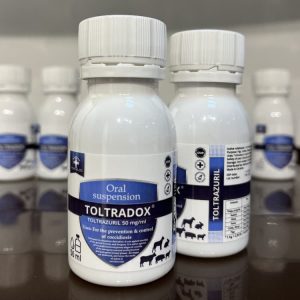When it comes to combating Cystoisosporiasis in dogs, the antiprotozoal medication toltrazuril has emerged as a potent and effective treatment option. With its broad-spectrum efficacy against various protozoal parasites, including Cystoisospora species, toltrazuril plays a crucial role in eradicating these troublesome parasites and providing much-needed relief to affected dogs. Understanding the mechanism of action and benefits of toltrazuril in Cystoisosporiasis treatment is essential for veterinarians and pet owners alike to make informed decisions about the management of this common parasitic menace.
Mechanism of Action
Toltrazuril belongs to the triazine family of compounds and exhibits a unique mechanism of action against protozoal parasites. Upon administration, the medication enters the dog’s system and specifically targets the intracellular development of parasites like Cystoisospora species. By disrupting the energy-producing structures within the parasites, toltrazuril effectively halts their multiplication and survival, ultimately leading to their elimination from the dog’s gastrointestinal tract.
Broad-Spectrum Efficacy
What makes toltrazuril particularly valuable in Cystoisosporiasis treatment is its broad-spectrum efficacy. Not only does it target Cystoisospora species, but it is also effective against other protozoal parasites, making it a versatile and powerful treatment option in veterinary medicine. This broad-spectrum activity ensures comprehensive coverage against various parasites that may be present in the dog’s gastrointestinal system.
Single-Dose Convenience
One of the significant advantages of toltrazuril in Cystoisosporiasis treatment is its single-dose convenience. Veterinarians typically prescribe a single oral dose of toltrazuril to treat the infection effectively. This ease of administration simplifies the treatment process for both pet owners and their canine companions, minimizing the stress associated with repeated dosing.
Well-Tolerated by Dogs
Toltrazuril is generally well-tolerated by dogs when administered at the appropriate dosage. Most dogs experience minimal to no side effects, and any observed reactions are usually mild and transient. However, as with any medication, some individual dogs may exhibit temporary gastrointestinal upset or lethargy. Such occurrences are usually short-lived and do not require additional medical intervention.
Preventing Recurrence
In addition to treating the active infection, toltrazuril also plays a crucial role in preventing the recurrence of Cystoisosporiasis. Pet owners are encouraged to adhere to proper hygiene practices, including regular cleaning and disinfection of living areas, prompt removal and disposal of feces, and providing access to clean water. Preventing reinfection is essential for maintaining the overall health and well-being of dogs.





